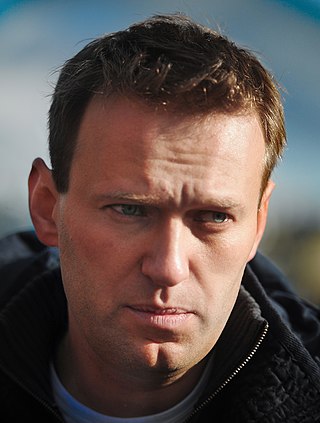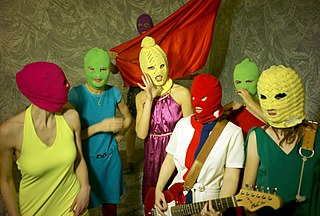
Mikhail Borisovich Khodorkovsky, sometimes known by his initials MBK, is an exiled Russian businessman, oligarch, and opposition activist, now residing in London. In 2003, Khodorkovsky was believed to be the wealthiest man in Russia, with a fortune estimated to be worth $15 billion, and was ranked 16th on Forbes list of billionaires. He had worked his way up the Komsomol apparatus, during the Soviet years, and started several businesses during the period of glasnost and perestroika in the late 1980s. After the dissolution of the Soviet Union, in the mid-1990s, he accumulated considerable wealth by obtaining control of a number of Siberian oil fields unified under the name Yukos, one of the major companies to emerge from the privatization of state assets during the 1990s.

Larisa Iosifovna Bogoraz was a dissident in the Soviet Union.
Racism in Russia mainly appears in the form of negative attitudes towards non-ethnic Russian citizens, immigrants or tourists and negative actions against them by some Russians. Traditionally, Russian racism includes antisemitism and Tatarophobia, as well as hostility towards the various peoples of the Caucasus, Central Asia, East Asia and Africa.

Manezhnaya is a pedestrian open space in the Tverskoy District, at the heart of Moscow. It is bound by the Hotel Moskva to the east, the State Historical Museum and the Alexander Garden to the south, the Moscow Manege to the west, and the 18th-century headquarters of the Moscow State University to the north.
Boris Vladimirovich Stomakhin is a Russian radical political activist, and editor of "Radical politics" periodical. He was convicted three times for hate speech, incriminating him advocating a dismemberment of the Russian Federation and inciting ethnic and religious hatred, and justification of terrorism. The convictions have been questioned by human rights organizations ARTICLE 19, Committee to Protect Journalists, and Union of Councils for Soviet Jews.
Freedom of assembly in Russia is granted by Article 31 of the Constitution adopted in 1993, where it states that citizens of the Russian Federation shall have the right to gather peacefully, without weapons, and to hold meetings, rallies, demonstrations, marches and pickets. In practice, the right to freedom of assembly is restricted by Russian authorities. According to a Russian law introduced in 2014, a fine or detention of up to 15 days may be given for holding a demonstration without the permission of authorities and prison sentences of up to five years may be given for three breaches. Single-person pickets have resulted in fines and a three-year prison sentence.

Alexei Anatolyevich Navalny was a Russian opposition leader, lawyer, anti-corruption activist, and political prisoner. He organised anti-government demonstrations and ran for office to advocate reforms against corruption in Russia and against President Vladimir Putin and his government. Navalny was founder of the Anti-Corruption Foundation (FBK). He was recognised by Amnesty International as a prisoner of conscience, and was awarded the Sakharov Prize for his work on human rights.

The murder of Egor Sviridov refers to an FC Spartak Moscow fan's death in a clash between two groups of youth, one of which was composed of recent migrants from Russia's North Caucasus republics. The affair took place on 6 December 2010 at Kronstadt boulevard in the north of Moscow. Sviridov's death provoked a number of high-profile rallies and rioting in the capital as well as in Saint Petersburg, Rostov-on-Don and other cities across Russia.

The Other Russia of E. V. Limonov, formerly The Other Russia, is an unregistered National Bolshevik political party in Russia, founded on 10 July 2010 by Eduard Limonov. The Other Russia was reorganized in September 2020 and changed its name to "The Other Russia of E. V. Limonov", in honor of their deceased founder who had died the same year. As a Russian political party adopting syncretic politics, it has been variously called far-left and far-right by the likes of Malaysia's The Sun, France's Le Point, and BFM TV, Belgian's RTBF, and Eurasia Daily Monitor and the Czech Republic's Expactz.cz, respectively.

The 2011–2013 Russian protests, which some English language media referred to as the Snow Revolution, began in 2011 and continued into 2012 and 2013. The protests were motivated by claims of Russian and foreign journalists, political activists and members of the public that the election process was fraudulent. The Central Election Commission of Russia stated 11.5% of official reports of fraud could be confirmed as true.

Pussy Riot is a Russian feminist protest and performance art group based in Moscow that became popular for its provocative punk rock music which later turned into a more accessible style. Founded in the fall of 2011 by 22 year old Nadya Tolokonnikova, it has had a membership of approximately 11 women. The group staged unauthorized, provocative guerrilla gigs in public places. These performances were filmed as music videos and posted on the internet. The group's lyrical themes included feminism, LGBT rights, opposition to Russian President Vladimir Putin and his policies, and Putin's links to the leadership of the Russian Orthodox Church.
The Bolotnaya Square case is a criminal case by the Investigative Committee of the Russian Federation on account of alleged mass riots and alleged violence against the police during the "March of the Millions" on May 6, 2012 on the Bolotnaya Square in Moscow. The demonstration was one of the biggest protests in Russia since the 1990s. By the number of accused, 37 persons, it is currently the largest criminal case against participants of public demonstrations in modern Russia.

Oleh Hennadiiovych Sentsov is a Ukrainian filmmaker, writer and activist from Crimea. Sentsov has directed the feature films Gamer (2011), Numbers, and Rhino (2021).

Alexey Vladimirovich Gaskarov is a Russian social activist and economist who has been a major figure in the democratic, left-wing opposition to the regime of Vladimir Putin. He was a leader of the Russian antifascist movement, and a member of the Coordinating Council of the anti-Putin opposition. He became famous as a prominent critic of the government's destruction of woodland.
Vladislav Yurevitch Ryazantsev is a Russian politician, former member of the National Assembly of the Russian Federation and a journalist.
Evgeny Vasilyevich Afanasyev (1952-2014) and Svyatoslav Bobyshev (b.1953) were professors at the Baltic State Technical University. In 2012, after two years of detention, the two were convicted of treason tied to alleged sale of Russian missile information to a Chinese spy. Russian Federation Courts sentenced Afanasyev to 12+1⁄2 years in a prison camp, and Bobyshev to 12. Afanasyev died in prison. Russia's Memorial Human Rights Center identified the scientists as political prisoners, and determined that their detention was a violation of international human rights agreements.
Zarema Bagavutdinova was a member of a Dagestan regional human rights group, "Pravozashchita" or "Human Rights Defense." She was imprisoned in July 2013 on charges of recruiting on behalf of an armed Islamic insurgency in the region of Dagestan. She was sentenced to five years of incarceration.
Yaroslav Gennadievich Belousov is a Russian political-science student who was a participant in the May 6, 2012, Bolotnaya Square protest against President Vladimir Putin and who has been imprisoned since June 9, 2012, as a result of his participation in the protest.
In 1965 a human rights movement emerged in the USSR. Those actively involved did not share a single set of beliefs. Many wanted a variety of civil rights — freedom of expression, of religious belief, of national self-determination. To some it was crucial to provide a truthful record of what was happening in the country, not the heavily censored version provided in official media outlets. Others still were "reform Communists" who thought it possible to change the Soviet system for the better.

Oyub Salmanovich Titiev is a Russian human rights activist and the head of Memorial's Grozny, Chechnya office. In 2018 he was arrested on politically motivated charges, sparking an international campaign by human rights groups calling for his release. On October 8, 2018, Titiev was awarded the Václav Havel Human Rights Prize, which honours "outstanding" defence of human rights in Europe and beyond.











